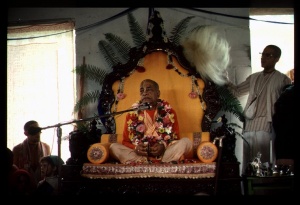SB 7.5.27

A.C. Bhaktivedanta Swami Prabhupada
TEXT 27
- santi hy asādhavo loke
- durmaitrāś chadma-veṣiṇaḥ
- teṣām udety aghaṁ kāle
- rogaḥ pātakinām iva
SYNONYMS
santi — are; hi — indeed; asādhavaḥ — dishonest persons; loke — within this world; durmaitrāḥ — cheating friends; chadma-veṣiṇaḥ — wearing false garbs; teṣām — of all of them; udeti — arises; agham — the reaction of sinful life; kāle — in due course of time; rogaḥ — disease; pātakinām — of sinful men; iva — like.
TRANSLATION
In due course of time, various types of diseases are manifest in those who are sinful. Similarly, in this world there are many deceptive friends in false garbs, but eventually, because of their false behavior, their actual enmity becomes manifest.
PURPORT
Being anxious about the education of his boy Prahlāda, Hiraṇyakaśipu was very much dissatisfied. When Prahlāda began teaching about devotional service, Hiraṇyakaśipu immediately regarded the teachers as his enemies in the garb of friends. In this verse the words rogaḥ pātakinām iva refer to disease, which is the most sinful and miserable of the conditions of material life (janma-mṛtyu jarā-vyādhi (BG 13.9)). Disease is the symptom of the body of a sinful person. The smṛti-śāstras say,
- brahma-hā kṣaya-rogī syāt
- surāpaḥ śyāvadantakaḥ
- svarṇa-hārī tu kunakhī
- duścarmā guru-talpagaḥ
Murderers of brāhmaṇas are later afflicted by tuberculosis, drunkards become toothless, those who have stolen gold are afflicted by diseased nails, and sinful men who have sexual connections with the wife of a superior are afflicted by leprosy and similar skin diseases.